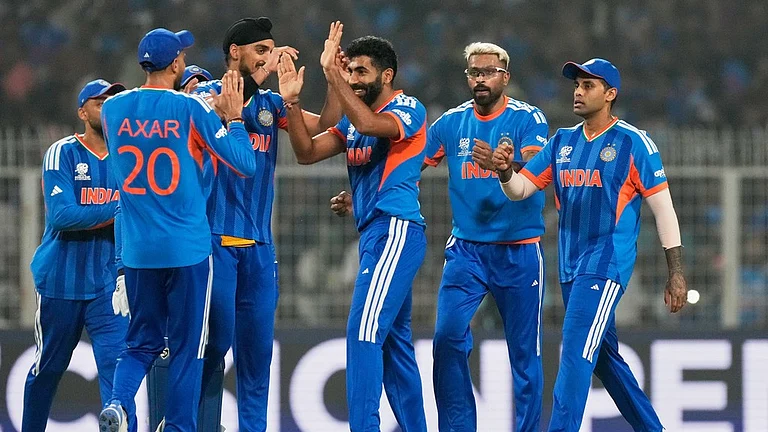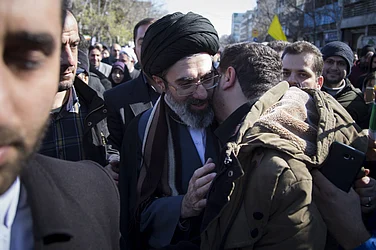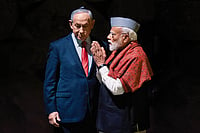Pakistan’s current political crisis began when the army chief General Qamar Javed Bajwa lost faith in former prime minister Imran Khan and decided to pull down the props that held the Pakistan Tehreek-e-Insaf (PTI) together.
Ironically, it was the army that removed Nawaz Sharif from power and ensured that Imran Khan win the 2018 elections. It was the army again that made certain that smaller parties in the PTI coalition did not drift away from Khan as the former prime minister often proudly declared that the government and the military were on the same page.
Since independence, the military has played an overarching role in Pakistan’s politics, removing democratically elected governments, seizing power and ruling directly when it suited an ambitious general. In short, Pakistan’s destiny has been linked to its powerful army. Foreign policy – especially relations with the US, India and all important world powers – remains the army’s domain.
The opposition Pakistan Democratic Movement (PDM), a coalition of eleven parties formed in 2020 to remove Imran Khan from power, saw an opportunity when the army turned its back on the PTI. Though both Nawaz Sharif’s Pakistan Muslim League (PML-N) and Zardari-Bhuttos of the Pakistan Peoples Party (PPP) had governments dismissed by the military, they were willing to play ball with General Bajwa. Imran Khan, on his part, tried to browbeat the opposition and used strong-arm tactics to keep MPs from coming to the National Assembly to vote. When the vote of confidence was finally taken, Imran had to bow out.
The Pakistan Democratic Movement won, with Shebaz Sharif, the former chief minister of Punjab and brother of Nawaz Sharif, taking office as Prime Minister.
Imran Khan’s popularity is rising and rising
But Imran Khan is not a regular politician and is immensely popular with young voters and large sections of both the poor and middle class. The mixture of a glamourous cricket captain, as well as a devout Muslim thundering against corruption of jaded political families, make him a major force in Pakistan’s politics. Imran was often referred to as Taliban Khan for his alleged defence of the Taliban and other jihadi groups. During his term in office, he played ball with religious extremist groups and defended the TTP. He said that the TTP was the result of Pakistan joining America’s war on terror.
Since his ouster, Khan had taken swipes at the army. It is not often that the army is publicly derided in Pakistan but Imran had put the entire blame on former army chief Bajwa, as well as the US, for not toeing Washington’s line on Ukraine. Subsequently, he withdrew that statement and focused mainly on Bajwa. Khan’s supporters, taking the cue from their leader, lambasted the military on social media – something that few had dared to do until now. The fact that Imran Khan decided to take on Bajwa could not have been possible without the support of the PTI within the army rank and file.
His popularity has soared, and the PTI has won every election since then. He is naturally now wanting national polls to be held quickly. PTI governments have dissolved both the Punjab and Khyber Pakhtunkhwa assemblies to force elections. The court has ruled that elections should be held within 90 days of these assemblies. However, with the dire economic situation and the rise in prices, the government was hoping to push the elections back, as far as possible. Prime Minister Shehbaz Sharif, who had a reputation for good governance as the chief minister of Punjab, has failed to deliver.
Imran Khan knows that the sooner the elections are held, the better his chances of winning. There is a tug-of-war between the government and Imran Khan over elections. The government’s excuse is that the country is low on funds and elections can be held when the economic condition stabilizes.
Will the army step back from politics?
Before leaving office last November, General Bajwa had said that the Pakistan army will not interfere in the country’s politics anymore. He claimed that since February 2022, the army leadership had decided to remain neutral and not intervene in the squabbles between political parties. This was perhaps the first time in Pakistan’s history that an army chief had made such a commitment and that too publicly.
Why good sense dawned on Bajwa only at the end of his tenure after falling out with his former protegee is open to question. But if this is the mood, it is a welcome change. The country has suffered irreparable harm, thanks to civilian governments having to always ensure that the army is on its side. In recent times, whether it was Benazir Bhutto or Nawaz Sharif, the army would not let them finish their full term.
Bajwa is out, and a new man has taken over. General Asim Munir has taken charge at a particularly difficult time for both the country and the military. Never before had the army’s reputation been dented as it was amid the political chaos triggered by Imran Khan losing a vote of no confidence in the National Assembly in April. Perhaps the only other time when the army was, was when the Pakistan army had to surrender to India in Dhaka during the Bangladesh war of liberation in 1971.
The low-key new chief has a spotless reputation and is unlike many other senior generals. In fact, his term as Pakistan’s spy chief was cut short after just eight months, thanks to then Prime Minister Imran Khan throwing him out after he pointed fingers at the PM’s wife, Bushra Bibi, and other members of her family for corruption. General Munir is not a PTI favourite. General Munir’s tenure ended as ISI chief when Imran Khan got him removed and brought in his favourite general Faiz Hameed to head the spy agency. Will it be easy for an army accustomed to dictating to political leaders to be able to shrug off its old habit? General Munir is not one of the high-flying officers of the Pakistan Army and shuns the spotlight. In his farewell speech and in the period ahead of his retirement, Bajwa spoke with some passion about the army not meddling in politics. Will Munir follow that advice? Or will Pakistan’s politicians constantly vying for military backing allow him to stay neutral? Only time will tell. Pakistan will become a normal democracy once the army keeps away from politics.























